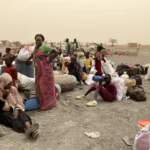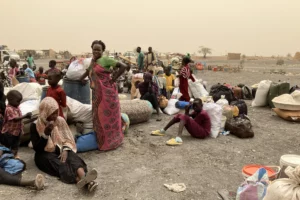Toronto, Atlanta (5/9 – 50)
An objective appraisal of representative democracy around the planet would conclude that it is in rather a poor condition – at least when held up and compared to an ideal. Singapore has been ruled in a mildly authoritarian manner by the same party since independence in 1965, while Japan’s one-party parliamentary democracy has endured since the end of Occupation in the early 1950s, with intervals out of power.
Europe, Australia and the USA are similarly beset with fossilized political parties that while holding a tight grip on power receive dismal approval ratings from the electorate.
In the “greatest country in the world™” a feeble, out-of-touch gerontocracy leaves the heavy lifting of practical politics to unelected Deep State operatives. Republican presidential candidate Nikki Haley caustically referred to the US Senate as “the most privileged nursing home in the country”, after the Republican leader in the Senate, 81-year-old Mitch McConnell, suffered a second brain-freeze before the cameras in a month, while speaking to reporters in Kentucky.
Russian democracy is more or less fixed in place by you-know-who, and countries like Malaysia struggle to appear democratic, while appeasing wealthy, influential, powerful religious, financial and military interests. And of course money talks. And talks and talks – money politics a problem everywhere.
The “Potemkin Village” democracy is apparently enough for disgusted militaries in Africa: there have been eight coups in the last three years, including the recent ouster of Gabon’s president by soldiers.
Why indeed are military takeovers, surprisingly popular with the citizenry at large, becoming prominent in Africa?
One explanation is that compromised governments are spectacularly failing to raise the welfare of the public at large – those who voted them in. Take Gabon, swimming in a sea of easily-accessible oil: just last week, military officers seized power after an announcement that President Ali Bongo had “won” a third term in office; this spelt an end to his spectacularly corrupt family’s 56-year hold on power. Bongo’s late father was known for shifting US$ 100 million here, US$ 100 million there, greeted happily by bankers in the EU and the USA. Meanwhile, the average family lives in desperate poverty: while on paper Gabon enjoys a per capita income four times that of most sub-Saharan African nations, its reliance on resource extraction industries see profits floating to France, the Bongo family and its cronies. 40% of the Gabonese population is said to live under a poverty threshold.
Compare that to Libya, which under the dictatorial rule of Col. Moammar Khaddafi, enjoyed one of the highest standards of living in Africa. After the 1969 Revolution, and the forced exit of King Idris, Khaddafi’s government initiated a process of directing funds toward education, health care and housing for all. Public education in the country became free and primary education compulsory for both sexes. Medical care became available to the public at no cost, while providing housing for all was an unfinished task. Under Gaddafi, per capita income in the country rose to more than US$11,000, the 5th highest in Africa. All without the “theater” of a parliament and a president.
Not everyone was pleased with the expulsion from power of the sartorial Bongo clan. The “African Union Peace and Security Council” met on Thursday, 25 August, announcing the immediate suspension of Gabon from “all activities of the AU, its organs and institutions” until the country restores constitutional order. They shouldn’t hold their collective breath.
In Mali, Burkina Faso, Guinea, Niger and Chad, coup leaders are still in control, despite widespread condemnation and sanctions. Former colonial masters, now clad in sheep’s clothing, are still vitally concerned about the loss of sweet deals, in cahoots with comprador regimes. France has long been a force to contend with in Niger, with particular concern for its uranium deposits. With others, it’s cobalt and other resources never touched by legacy inhabitants.
One current theory is that the USA, instigator of various “Arab Spring” upheavals, is behind at least some of the coups, considering that most of the African military leaders springing coups have had training there: between 1999 and 2016, across 34 different programs, the USA hosted some 2,395,272 trainees from virtually every country in the world, peaking at 292,753 in 2008. Could the Americans, displeased with President Macron making google-eyes at the PRC, be punishing him, and rebellious France, through a squeeze on his African resources?
Foreign players have never given up on meddling in Africa. At the moment the People’s Republic of China is the most prominent meddler, and through “soft power” and plenty of baksheesh as well as meaningful infrastructure investment gained fresh new friends.
Russia, on the other hand, can offer muscle: the ambitious mercenaries of Wagner Group have already connected with coup leaders, offering counsel and protection; the late Mr. Prigozhin had consulted with the freshly-installed leaders in Niger before his recent “accident”. Assuming, of course, that he is dead.
What is curious and interesting about the foreign sanctions imposed on countries where coups have occurred is that ordinary citizens are suffering the most (just like the US sanctions on Iraq – remember that one?) Such attempts at punishment have only hardened local resistance to outside interference and bolstered popular support for the various juntas.
Is a return to an era of coups a “new norm”?
So what are the basic reasons why the military carries out coups, considering how such power grabs threaten a reversal of African democratization, slowly making progress over the past two decades?
Remi Adekoya, a political analyst and associate lecturer at York University, noted that “In the early postcolonial decades when coups were rampant, Africa’s coup leaders virtually always offered the same reasons for toppling governments: corruption, mismanagement, poverty.”
“While well-worn, these justifications still resonate with many Africans today, because they continue accurately depicting their countries’ reality. Furthermore, in many countries, people feel these problems are worsening,” he added.
A survey by Afrobarometer, a pan-African, nonpartisan survey research network, confirmed that popular perceptions of increased corruption levels are quite widespread in African countries, as average citizens disgustedly declare that their governments are doing little to fight corruption – or are themselves on the take.
“And in a bad sign for activists working to engage citizens on this issue, most Africans say they risk retaliation should they report corruption cases to the authorities,” Afrobarometer commented.
Such despicable conditions create a fertile environment for coups, as increasingly desperate young Africans lose patience with their corrupt leaders and welcome the military as salvation, promising radical change to a miserable status quo.
On Friday, videos on social media showed some elated Gabonese kissing and hugging soldiers following the military takeover of leadership in the oil-rich central African country.
Niger: On July 26, 2023, the military overthrew President Mohamed Bazoum.
Burkina Faso: In January 2022, Burkina Faso’s army removed President Roch Kabore, blaming him for failing to contain violence by Islamist militants. In September of that year, there was a second coup by army Captain Ibrahim Traoré, who forcibly deposed Paul Henri-Damiba.
Guinea: In September 2021, special forces commander Colonel Mamady Doumbouya overthrew President Alpha Conde. A year earlier, Conde had changed the constitution to circumvent limits that would have prevented him from standing for a third term, triggering widespread rioting.
Chad: In April 2021, Chad’s army took power after President Idriss Deby was killed on the battlefield while visiting troops fighting rebels in the north.
Mali: In August 2020, a group of Malian colonels removed President Ibrahim Boubacar Keita. The coup followed anti-government protests over deteriorating security, contested legislative elections and allegations of corruption. Nine months later, a countercoup happened, with Assimi Goita, named vice president after the first one, leading the second and becoming head of state.
Sudan: In October 2021, General Abdel Fattah al-Burhan led a military takeover in Khartoum, dissolving a ruling council in which the army and civilians had shared power and throwing the country’s democratic transition into turmoil.















